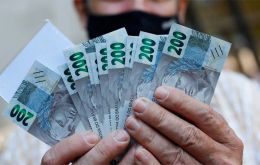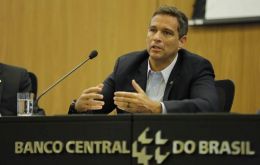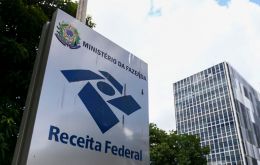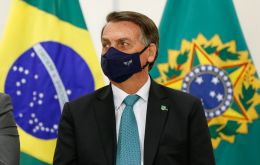MercoPress. South Atlantic News Agency
Tag: Central Bank of Brazil
-
Thursday, September 15th 2022 - 19:20 UTC
Brazil's economic activity going up, Central Bank index shows

Brazil's economy jumped 1.17% in July from June's figures, according to the Central Bank's Economic Activity Index (IBC-Br) released Thursday based on seasonally adjusted data.
-
Tuesday, June 28th 2022 - 09:31 UTC
BCB head says worst part of inflation in Brazil is over

Brazil's Central Bank (BCB) CEO Roberto Campos Neto said Monday that the worst part of inflation in his country was over, after the proper tools to curb the process had been taken.
-
Friday, June 24th 2022 - 00:20 UTC
Brazil: Inflation and GDP projections up from March figures

Brazil's Central Bank (BCB) Thursday announced it projected a 1.7% increase in the country's Gross Domestic Product (GDP) by the end of 2022, thus improving a previous forecast released in March, which mentioned merely 1%.
-
Saturday, May 14th 2022 - 08:33 UTC
Brazil invited to abide by OECD codes of good practices

Brazilian economic authorities Friday announced they had received an invitation from the Organization for Economic Cooperation and Development (OECD) Council to abide by both the Capital Movements Liberalization Code and the Intangible Current Operations Liberalization Code.
-
Thursday, May 12th 2022 - 10:10 UTC
Brazil consumer prices increased 1.06% in April and 12,13% in twelve months

Consumer prices in Brazil increased 1.06% from March, the fastest rise for the month of April since 1996, the Brazilian Institute of Geography and Statistics, or IBGE, said on Wednesday. Prices rose 12.13% from a year earlier, the fastest pace since 2003. In March, prices rose 1.62% from February and increased 11.30% from a year earlier. Again food and transport had a decisive impulse.
-
Friday, April 1st 2022 - 22:16 UTC
Brazil's Central Bank workers go on indefinite strike

Employees of Brazil’s Central Bank (BCB) Friday went on strike to demand better wages. The workers have announced that their measure will continue until an answer has been achieved. The new circumstances affect local payments and other services, it was reported.
-
Wednesday, March 16th 2022 - 22:55 UTC
Brazil's Central Bank raises interest rate to 11.75%, highest since 2017

Brazil's central bank (BCB) on Wednesday raised its benchmark interest rate by 1 percentage point to 11.75%, a high in nearly five years, in a bid to curb inflation that “continued to surprise” amid pressures exacerbated by the war in Ukraine. Last time with such a high inflation was last April, 2017.
-
Wednesday, February 23rd 2022 - 20:07 UTC
Federal tax collection in Brazil 18.3% up in January

Collection of federal taxes in Brazil has reached its peak since 1995, according to a report from the Economy Ministry released Wednesday, which showed revenues had reached R$ 235.3 billion in the month of January of 2022.
-
Thursday, February 3rd 2022 - 09:55 UTC
Brazil rises Selic interest rates amid growing inflation

Brazil's Central Bank (BCB) Wednesday increased its benchmark interest rate (Selic) by 1.5 percentage points, reaching 10.75%, the first time in five years it hit double digits, amid a growing inflation and despite the consequences, this measure may have on economic growth.
-
Friday, December 10th 2021 - 09:56 UTC
Brazil raised the benchmark interest rate to 9,25% to try and contain inflation

Brazil's Central Bank raised its benchmark interest rate 150 basis points for the second time running to 9,25%, the highest since 2017, in an effort to contain growing inflation.
